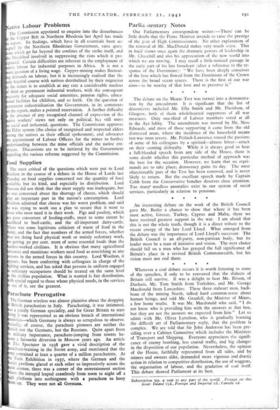ative Labour ProblemS
The Commission appointed to enquire into the disturbances the Copper Belt in Northern Rhodesia last April has made report. Its findings, which have in all essentials been ac- pted by the Northern Rhodesian Government, raise ques- ons which go far beyond the confines of the strike itself, and e bloodshed involved in suppressing the riots which it pre- pitated. Certain difficulties are inherent in the employment of rive labour for industrial purposes in Africa. It is not a ere question of a living wage. Copper-mining makes fluctuat- e demands on labour, but it is increasingly realised that the iv hopeful course with natives detribalised by their migration the mines is to establish at any rate a considerable nucleus f them as permanent industrial workers, with the consequent ecessity for adequate social amenities, pension rights, educa- onal facilities for children, and so forth. On the question of ermanent industrialisation the Government, in its comments n the report, makes a pointed reservation. A further difficulty the absence of any recognised channel of expression of the tire workers' views not only on political, but still more n social and industrial, questions. The Commission approves e Elder system (the choice of recognised and respected elders mong the natives as their official spokesmen), and advocates e appointment of Labour Officers for the mines to further nderstanding between the mine officials and the native em- loyees. Discussions are to be initiated by the Government arding the various reforms suggested by the Commission.






























 Previous page
Previous page